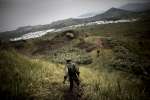- Text size
 |
|  |
|  |
| 
- Français
UNHCR advises refugees in Burundi against returning to eastern Congo
News Stories, 6 October 2009
BUJUMBURA, Burundi, October 5 (UNHCR) – The UN refugee agency has advised some 2,300 Congolese refugees at a camp in central Burundi to shelve plans to return this week to South Kivu province in eastern Democratic Republic of the Congo (DRC) because of conflict in the area.
"Due to the ongoing military operations [by the Congolese armed forces against rebel forces] in their areas of origin, UNHCR has urged the refugees not to go back for the moment," a UNHCR spokesperson said. "We have underlined to those planning to repatriate that, under the prevailing security conditions, neither the government authorities in the DRC nor UNHCR would be in a position to guarantee their safety upon return or to assist them in any other way."
The Congolese refugees at Gihinga camp, Mwaro province, originate mainly from South Kivu's Uvira region bordering Burundi. UNHCR, in cooperation with the Burundian government, had planned to move them to a new camp in Bwagiriza, eastern Burundi, as part of a camp consolidation programme. But only 264 agreed to moved, while about 2,300 refugees said they would instead return to the DRC this week.
UNHCR is concerned that the safety of the refugees could be threatened if they return to South Kivu at a time of insecurity in parts of the province. The Congolese refugees said they feared for their safety in Bwagiriza because of its proximity to what they claim is a rival Congolese community in nearby Tanzania.
Despite UNHCR assurances that the camp was at a safe distance from the border, the refugees said they preferred to return to South Kivu and informed local Burundian authorities of their planned departure this week.
"We support return as the preferred solution for any refugee. However, the conditions for organized voluntary repatriation to eastern DRC do not exist at present. We have already been forced to suspend the repatriation operation to eastern DRC earlier this year because of the ongoing military operations," the UNHCR spokesperson said.
UNHCR's office in Burundi assists and provides protection to some 30,000 mostly Congolese refugees living in three refugee camps, as well as in urban areas.
By Bernard Ntwari in Bujumbura, Burundi







































